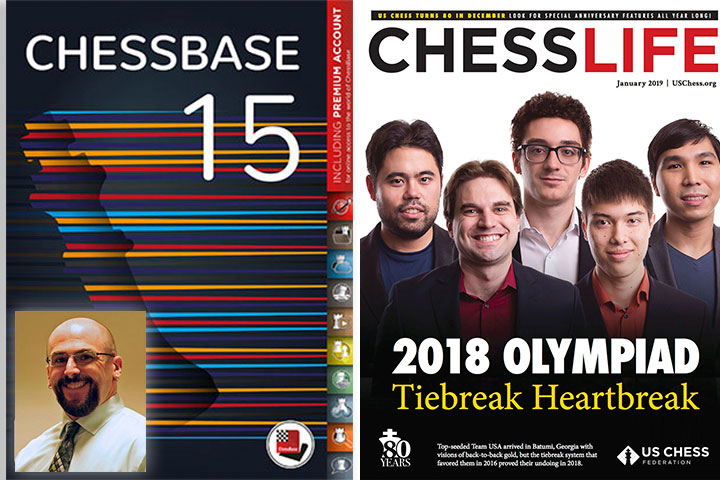


ChessBase 17 - Mega package - Edition 2024
It is the program of choice for anyone who loves the game and wants to know more about it. Start your personal success story with ChessBase and enjoy the game even more.
A full review was originally published in the January 2019 Chess Life, www.uschess.org, and is excerpted with permission of US Chess.
This month we are renaming this column from “Looks at Books” to “Books and Beyond.” Our focus will remain on printed chess literature, which remains the centre of theoretical discussion and output, and which generally continues to grow in quality with innovative publishers and the aid of our silicon friends.
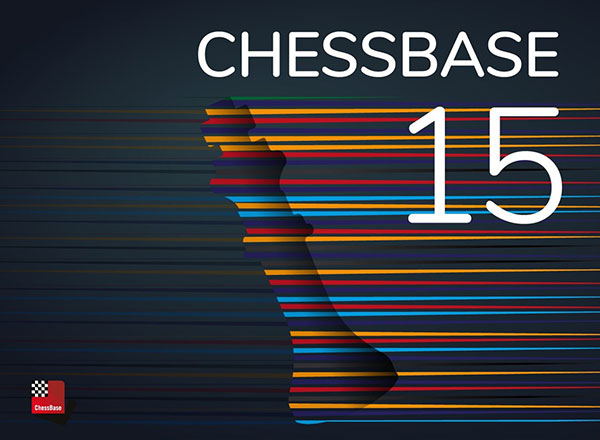
We will also, from time to time, expand our focus a bit and investigate new digital products and programs. In this month’s column, we’ll look at two of the most interesting non-book releases in recent months: the granddaddy of all chess software, ChessBase, and Chessable, the new kid on the block.
ChessBase is the leading chess software manufacturer in the world, and its market share among the chess elite reaches monopoly status. Almost every leading player uses its products, and none more so than its flagship program, the eponymous database manager ChessBase, newly released in its 15th edition.
The core functions of ChessBase all revolve around data management. Users can collect, maintain, and search vast collections of games to study openings, middlegame structures, and typical endings with plug-in engines like Fritz, Komodo, or Stockfish. Many of these core functions have been fairly mature since, say, ChessBase 7. So why would anyone need a newer version?
ChessBase had for some time answered this question with two words: the Cloud. Beginning with ChessBase 11, users could access online game databases from within the GUI. In ChessBase 12 the ‘Let’s Check’ feature from Fritz 13 was ported over, remote access to engines via the ‘Engine Cloud’ was introduced, and new analysis and search functions appeared. With ChessBase 13 the ‘ChessBase Cloud’ was born, allowing users to store and share data on ChessBase’s servers, and taking initial steps towards integrating ChessBase web account features into the program.
ChessBase’s authors returned their focus to in-program innovation with ChessBase 14. ‘Tactical analysis’ — automated engine analysis of specific games, previously available only in the Fritz interface – was introduced, as was assisted analysis, which provided tactical tips via the colour-coding of possible moves. The way that games were saved changed, so that what was two functions — save and replace — became one unified process.
ChessBase 15 continues in this vein, with an impressive list of new features and tweaks that refresh the venerable program. Among the most important of these is ‘replay training,’ revamping training features to make them more interactive.
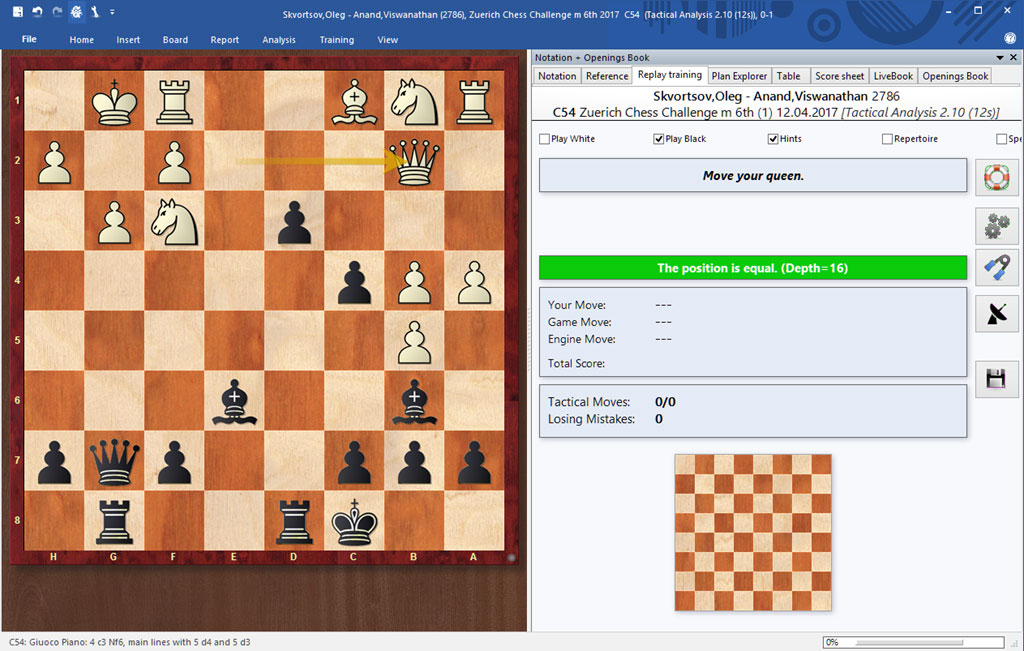
When the Training tab is activated, ChessBase keeps track of user accuracy in predicting moves, and an internal engine — a modified version of Ginkgo — assesses their relative strength. That same internal engine operates in “Instant Analysis,” a feature where games are very quickly analyzed upon loading, with each move’s evaluation appearing in a bar graph below the notation window.
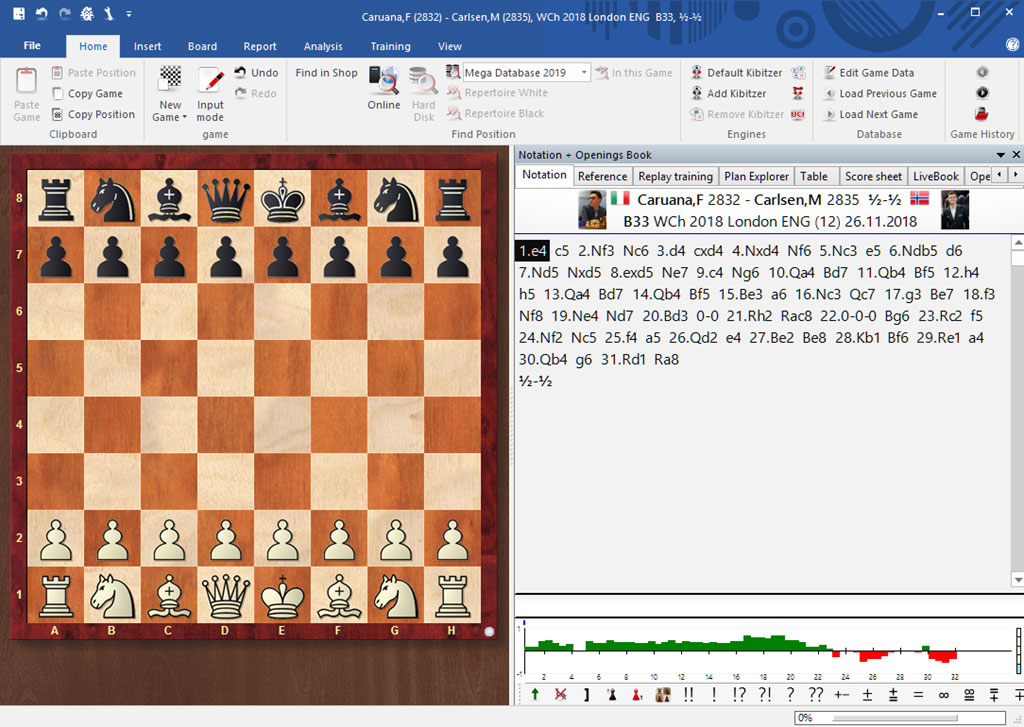
Search functions are also improved in ChessBase 15. There is a simplified, ‘one-line’ search for quick queries, and a number of new and upgraded search types are possible, including resulting endgame probabilities and plan explorers for specific positions.
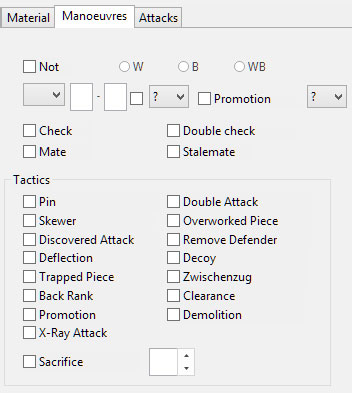 My favourite new feature, however, is the introduction of a tactical search mask. Users can now search databases for specific tactical themes, ranging from double attacks to overworked pieces to back-rank weaknesses.
My favourite new feature, however, is the introduction of a tactical search mask. Users can now search databases for specific tactical themes, ranging from double attacks to overworked pieces to back-rank weaknesses.
The results are not perfect — every double attack is found through this search, even banal ones — but mining data for interesting tactics has never been easier.
One of ChessBase’s strengths is its ability to continue to innovate so far into its lifespan. Some changes, like the move towards the Cloud, are fairly organic, arising from broader technological advances. Others appear to be direct responses to competitors' products.
The Deep Analysis feature introduced in ChessBase 12 and 13 is a take on Interactive Deep Analysis, or IDeA, in Convekta’s Aquarium program. The new training tab in ChessBase 15 has clear antecedents in openings trainers like Chess Position Trainer, ChessBase’s own Cloud Opening Trainer, and, most recently, Chessable...For me, ChessBase is the rare product that lives up to its advertising. When Garry Kasparov says that ChessBase is the most important innovation in chess since the printing press, he is not exaggerating. If you are a real student of the game, and you are not using ChessBase, you are shortchanging yourself.
The real question comes for those who are already using ChessBase. Is it worth upgrading to 15? For those using ChessBase 12, my sense was that updating to versions 13 or 14 was not entirely necessary unless specific features were of great personal value.
The weight of the cumulative improvements in ChessBase 15 may alter this recommendation. The auto-analysis features in 14 and 15 are useful, the integration of Cloud and web features is ever-tightening, and search enhancements are truly impressive. 15 introduces a new, backward compatible database booster that speeds all manners of searches, and the tactical search is a show-stopper. ChessBase is a mature, best-of-class product, and I cannot imagine seriously studying chess without it.